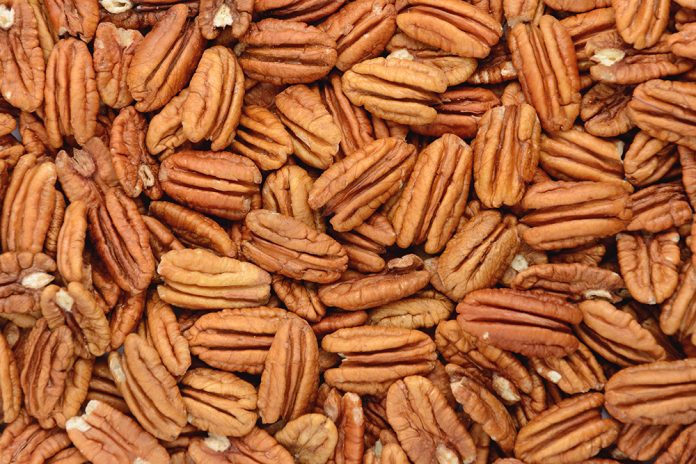
The formation of APC as a resource dedicated to marketing American Pecans in the U.S. and internationally was a huge step forward for the industry, but consumer research confirmed there was much work to be done; familiarity with and purchase of pecans was lower than that of almost all other nuts. In fact, research showed that many people thought of pecans as a baking ingredient, rather than a nut. The challenge was clear; demand would not increase if consumers only thought of pecans for holiday pies. To dramatically grow demand for pecans meant we must first drive awareness of pecans and reframe the way today’s consumers think about them. Much more than a seasonal pie ingredient, pecans must become a healthy and convenient cooking and snacking staple.
To do this, we knew we needed to double down on marketing the health benefits of pecans. We needed to accelerate nutrition research to expand messaging of pecan-specific health benefits. Four clinical trials on pecans and heart health had been published.
Two studies examined the impact of a pecan-enriched diet on blood cholesterol levels, and two studies were conducted to explore the relation of eating pecans on blood gamma-tocopherols levels and oxidation of LDL “bad” cholesterol. While these studies provided insights into the potential relationship between pecan-rich diets and cholesterol levels, the results were unique to the study design. Since evidence was limited, more research was needed to understand how compounds in pecans may play a role in supporting normal cholesterol and blood lipids.
Request for Proposals
In 2019, we put out an RFP in Nutrition Research to further investigate the health benefits of this delicious nut. As part of this initiative, we worked with Johnson Nutrition Solutions to conduct one-on-one interviews with five leaders in the research community to solicit their opinions on the research areas of greatest potential benefit. Two areas that rose to the top for initial studies were cardiovascular health and weight management.
Cardiovascular Health
APC solicited proposals that examined the effect of pecans on cardiovascular disease (CVD) risk factors. Priority was given to proposals that included measures of peripheral vascular health (including endothelial function) and less commonly measured CVD risk factors such as circulating epoxide concentration, platelet function and reactivity as well as LDL susceptibility to oxidation. Such factors were of particular interest due to the high flavonoid content of pecans. Both acute and non-acute studies were considered although proposals that began with an acute pilot study phase were particularly attractive. The inclusion of secondary endpoints related to cognitive performance, changes in the microbiome, inflammatory markers and/or more conventional CVD risk factors (e.g., lipids, blood pressure, fasting blood glucose/insulin) were desirable if they were compatible with the protocol.
Weight Management
Acute and/or short-term studies that examined the ability of pecans to contribute to weight management were also a priority for APC. At a minimum, such studies were asked to measure hunger/satiety and spontaneous energy intake after a pecan-based meal. Studies that examined the role of pecans as healthy snacks were of particular interest. Both acute and non-acute proposals were considered, although proposals that began with an acute pilot study followed by short-term, non-acute experiments (e.g., two weeks) were particularly attractive. The inclusion of secondary endpoints (especially cognitive measures) as well as CVD risk factors or changes in the microbiome were desirable if they were compatible with the protocol. Proposals for long-term studies that examined the effect of pecan-containing diets on body weight loss and/or maintenance were not desired at this time.

APC’s Current Research Studies
From the RFP, three proposals rose to the top that APC chose to fund. Below, we’ll provide a brief overview of these three studies. Due to COVID-19 delays, all three studies are currently underway, so we will provide anticipated results:
The Ability of Pecan Consumption to Improve Vascular Function and Reduce Chronic Disease Risk in Aging Adults
Study headed up by Dr. Jamie Cooper at the University of Georgia
Background: Cardiovascular disease is the leading cause of death in the U.S., which is influenced in large part by elevated blood lipids and worsened vascular function.
Purpose of Study: To examine the impact of daily pecan consumption for a four-week period on vascular health and other markers of CVD risk in aging adults (50 to 75 years old).
Anticipated Results: Because of the healthy nutrient profile of pecans (high antioxidant levels, high levels of healthy fats and rich in fiber, protein and other micronutrients), and initial studies showing improvements in lipids in healthy adults, the researchers hypothesize that daily pecan consumption will be a viable option for adults looking to reduce their CVD risk. They expect to find that daily pecan consumption for four weeks in aging adults will improve large artery and microvascular function in response to a high saturated fat meal. They also expect to observe improvements in several CVD and other chronic disease risk factors from pre- to post-pecan diet intervention with no changes in the control group. These CVD risk factors include measures of platelet function, inflammation, glycemic control, cholesterol, lipid metabolism, antioxidant status and appetite.
Benefit to Industry: Provide meaningful health messages about the CVD-related improvements from pecan consumption in a population most at risk for chronic diseases and increase annual consumer demand.
Cardiometabolic Effects of Including Pecans as a Snack to Improve Diet Quality: A Randomized Controlled Study
Study headed up by Dr. Penny Kris-Etherton and Dr. Kristina Peterson at Penn State University
Background: Our understanding of the effects of pecans on markers of peripheral vascular health is limited, despite their nutrient and polyphenol profile that is likely to be cardioprotective. Pecans are rich in unsaturated fatty acids and bioactives including flavonoids and phytosterols.
Purpose of Study: To examine how substitution of usual snack foods with 2 oz./day of pecans affects markers of peripheral vascular health, lipids and lipoproteins, blood pressure and glycemic control compared to habitual U.S. intake.
Anticipated Results: It is hypothesized that replacement of typical snack foods with 2 oz./day of pecans will improve peripheral vascular assessments, lipid and lipoprotein profile and glycemic control compared to usual average American intake. It is expected that intake of pecans as a snack will improve diet quality and confer important cardiovascular benefits because of the combination of improved diet quality and the phenolic composition of pecans.
Benefits to Industry: Provide high quality evidence about the role of pecans, as a snack, in the American diet. The findings will likely be reviewed in the development of future dietary guidelines and other population-based nutrition recommendations.
A Randomized, Two Condition, Crossover Trial Assessing Appetite, Energy Metabolism, Blood Biomarker and Ad Libitum Food Intake Responses to a Mid-Morning Pecan Snack vs. an Equicaloric High Carbohydrate Savory Snack in Healthy Overweight and Obese Volunteers
Study headed up by Dr. John C. Peters at the University of Colorado, Denver
Background: Pecans have been associated with beneficial effects on appetite, blood markers and energy balance based on studies of other tree nuts, but pecan-specific effects have not been fully characterized. If pecans are to be seen as potential aids for weight management, then it is important to directly document their effects on subjective feelings of hunger, satiety, desire to eat, palatability and pleasantness as well as ad libitum consumption at a meal following a pecan or control snack.
Purpose of Study: Examine the effect of a mid-morning snack of pecans vs. a high-carbohydrate savory snack (unsalted pretzels) on appetite (subjective feelings of hunger, fullness), energy expenditure, blood biomarkers of appetite and metabolism and ad libitum food intake at lunch.
Anticipated Results: The researchers hypothesize that pecans will provoke greater feelings of fullness and reduced hunger after the snack and lunch meal consumption (on either a calorie per calorie or volume basis.) They also hypothesize that the pecan snack will provoke greater responses of satiety hormones compared to pretzels and increase energy expenditure and fat oxidation post consumption.
Benefit to Industry: Provide a comprehensive characterization of the effects of pecan snacks on appetite, blood appetite hormone and energy substrates and energy expenditure. The data can be also used to generate hypotheses for testing in longer term studies aimed at understanding the potential benefits of pecans on nutrition and body weight management.
A Look Ahead…
The APC has begun to take strides in conducting human nutrition research specific to pecans, but we have just scratched the surface with three pioneer studies currently underway. Some other potential areas of interest for future nutrition research include, but are not limited to diabetes, stress relief and male-reproductive health. Many older commodity boards have well-established research programs dating back decades and they continue to invest largely in nutrition research and sustainability efforts, showing how much value they continue to place there. We have a lot we can learn from the path they have paved as we continue to invest in nutrition research studies and getting the message out on the nutrition story unique to pecans.










